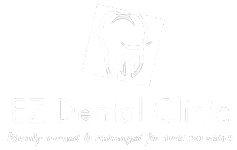If you think tooth loss only affects a small percentage of people, think again: Experts estimate that about 178 million men and women (69% of adults) in the United States have lost at least one tooth. Roughly 40 million Americans (15% of adults) are missing all their natural teeth.
At EZ Dental Clinic in Bellevue, Washington, our expert team wants to help you maintain a beautiful smile and optimal oral health for life. Because we realize a little knowledge can go a long way, we’ve put together a basic fact sheet on tooth loss.
Here’s what you should know about its main underlying causes, what you can do to prevent it, and how to treat it.
Common causes of tooth loss
Adults lose permanent teeth for many different reasons. The five most common are:
1. Gum disease
Gum disease (periodontitis) is the leading cause of tooth loss. It occurs when plaque, tartar, and bacteria buildup on teeth cause inflammation and infection below the gumline. When left untreated, gum disease can destroy the bone that supports your teeth, causing them to loosen or fall out.
While gum disease is a widespread problem — nearly one in two adults aged 30 and older and almost three in four adults aged 65 and older have it to some degree — it’s preventable and highly treatable, especially in its early stages.
2. Dental decay
Another top cause of tooth loss is dental decay and cavities. As one of the most common oral health issues among people of all ages, dental decay develops when plaque-trapped bacteria eat away at tooth enamel. Mild to moderate cavities are typically resolved with fillings, inlays, or onlays that restore tooth strength, structure, and function.
When dental decay goes untreated, however, it often leads to a deeper infection that requires a tooth-preserving root canal or, in severe cases, an extraction. Many deeply decayed teeth fall out on their own.
3. Oral trauma
Physical injury and dental trauma can also lead to tooth loss, sometimes in ways that are hard to prevent. Trip-and-fall accidents and car crashes are just two ways you can unexpectedly find yourself in a dental emergency like a knocked-out tooth.
But preventable dental trauma can also lead to tooth loss, including playing a contact sport without a mouthguard, habitual teeth grinding or chewing on ice, and frequently using your teeth as tools.
4. Chronic illness
You may know research has linked the development of certain chronic illnesses (heart disease, diabetes) to poor oral health. Do you also know that certain systemic diseases can help set the stage for gum disease, accelerate the process, and lead to tooth loss?
Chronic conditions like uncontrolled diabetes, high blood pressure, rheumatoid arthritis, and bone disease can be major underlying factors in tooth loss when they trigger or accelerate gum disease.
5. Lifestyle factors
Proper nutrition is just as crucial to your oral health as it is to your overall health. When you don’t get enough of the essential vitamins and minerals that support healthy teeth and gums — including calcium and vitamin D, phosphorus, vitamin C, and vitamin A — your mouth can suffer.
As one of the worst health habits you can have, smoking is a common contributing factor in tooth loss. Tobacco use makes you three times more likely than a nonsmoker to develop gum disease, the leading cause of tooth loss.
How you can prevent tooth loss
The statistics may make it seem as though tooth loss is an inevitability for many people, but that’s simply not the case — or it doesn’t have to be. You can do a lot to keep most of, or all, your natural teeth as you age. To prevent tooth loss, you should:
- Brush thoroughly twice daily to prevent plaque buildup
- Floss at least one time per day to promote healthy gums
- Have regular dental checkups and professional cleanings
- Manage existing gum disease to keep it from progressing
- Wear a fitted mouth guard when you play contact sports
- Wear a night guard if you grind your teeth in your sleep
- Quit smoking or get help with a smoking cessation program
You can also support your oral health by eating a nutritious diet and keeping chronic health conditions under control.
Your tooth replacement options
If you lose a tooth, replacing it promptly is the best way to restore your chewing ability (oral function) and the appearance of your smile (oral aesthetics). Prompt tooth replacement is also the best way to protect and preserve your long-term oral health.
Our team works with you to determine which restorative solution is right for you:
- Dental implants
- Implant-supported dentures
- Conventional dentures
- Dental bridge
If you have questions about tooth loss, we have answers. Call 425-746-6090 today, or use our online booking feature to schedule a visit at EZ Dental Clinic any time.
